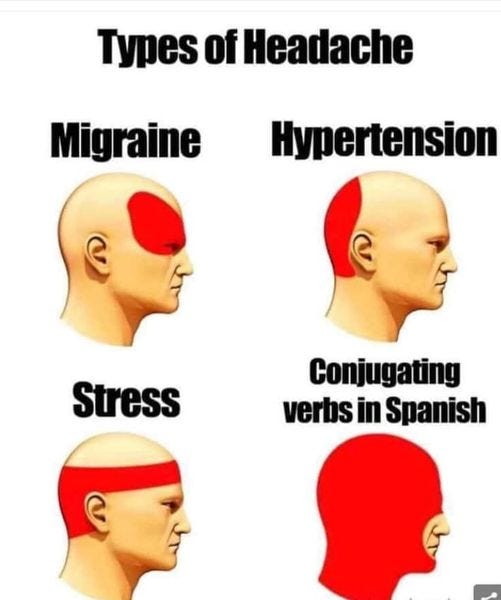Morgan Freeman, Morgan Freeman
Narrating your life, the internal voice
Welcome, aspiring polyglot! Many people have asked me how they can get more speech practice into their daily life. What matters most, though, is production. By working on your language production, which does include speaking, you are making it easier for you to recall different vocabulary words and grammar structures when it matters. But, how can you add language production to your daily routine without throwing everything all out of whack? Simple.
Start narrating your life. Since it will be in your head, at first, you can give yourself any narrative voice you want. Morgan Freeman is a popular choice, but then you have to think of how Morgan Freeman would go about speaking your target language. Over time, this voice will evolve and, eventually, you will take it as your own. However, when you are first getting started, sometimes it’s more enjoyable to pretend someone else made a mistake rather than you.
Getting out of your own head
Speaking for the first time in a new language is always going to be intimidating. As much as I would love for there to be an easy fix, it just does not exist. There are, however, ways to build your confidence before ever having to say a word to another person. Talking to yourself may be considered strange in other contexts, but when it comes to language acquisition it is actually incredibly helpful. In your head or aloud, speaking with yourself will train you to form sentences.
I think almost everyone has experienced the feeling of coming up with the perfect come back or counterargument two hours after the end of the conversation. Well, next time that happens to you think of the ways you might have that exact same argument, or conversation, in your target language. Coming up with these preemptive comebacks may never pay off, but the vocabulary and recall you are using to make it happen will serve you in the future.
It doesn’t have to be a discussion, either. Daydreams are powerful conduits for language production. For more on how to use your daydreams for language learning, check out this article:
Day Dreaming
Welcome, aspiring polyglot! Nowadays it almost seems like boredom requires innate talent. The ability to shut out all of the noise is becoming increasingly rare, but it remains something that anyone reading this can do. Boredom is important because it begets creativity and with creativity you can dream. Whether it happens when you are awake or when you …
The goal of these intermittent thought exercises is to give your brain a reason to restructure the language centers of your brain. Language learning plateaus are usually just the brain restructuring how it views and processes language. That is why it can feel so terrible. In reality, your brain is silently rewiring and the benefits will come so long as you do not give up. Giving your brain a reason to continue evolving will accelerate the speed at which the restructuring will happen.
Arguing with yourself
While we have all experienced the “I thought of the best argument 2 hours later”, perhaps the more interesting arguments are the ones we have internally. Here, again, a chance to give yourself a voice in your new language. Honing your ability to think in multiple languages will serve you in several ways. Primarily your ability to word your positions should become exponentially more clear. This is one of the benefits of the curse of losing words from languages you have always spoken.
Finding the “best” way to say something is never easy. With the near infinite options multiplied by every new language you learn, sometimes the best way ends up being any way possible. Especially at first. Depending on your language “level”, as determined by you, the amount of effort you should put into fighting for the best vocabulary will vary. If you have absolutely no trouble structuring your sentences, then it is probably time to break out the thesaurus and grow your vocabulary.
Whispering under your breath
A large vocabulary can be a curse as much as it is a blessing. There will be times when you can’t remember basic phrases and key words in one language, but you can remember the most eloquent possible way to say that same thing in another language. One of the better ways to commit these words to your quick access memory is by practicing the pronunciation.
Even words that you think you will always remember can vanish in an instant and that frustration can be enough to cause a negative feedback cycle that will spiral into complete shutdown of the linguistic centers of the brain. Stress, frustration, and anxiety cause interference in one’s own native language. The effects are amplified on secondary and tertiary languages. For that reason cortisol management is an important skill.
Being prepared by dedicating ample time to practice pronunciation will give you a boost immediately. Personally, I have always found it fun to learn a new word and then practice it by whispering it under my breath until I get it right. Sometimes I look crazy. Well, most likely all the time, but my wife was being nice when I asked her. Still, there is no arguing with the efficacy of the method. Blending in with native speakers is possible, but sometimes you have to risk sounding and looking a little weird.
Individual words are important, but fluidity matters more. This is something everyone comes to realize sooner or later and that is particularly true for those who use flash cards often. Don’t get me wrong, if they work for you, use them. I just think there are better ways. For example, in my opinion the best way to practice fluidity is to use the language. However, hours of production on end can be more detrimental than they are helpful.
Instead of coming up with hundreds of sentences to practice your speech, open a book and read out loud. While you do this, stop trying to understand the material. Focus entirely on pronunciation and fluidity. Read one sentence at a time until you are certain you are ready to maintain a constant speed throughout the page or pages. I’ve seen this exercise work in my languages and in hundreds of others working on adding a new language to their repertoire. But it takes months, not days.
Conclusion
Moving from inside thoughts to outside thoughts is one of the most challenging parts of learning a new language. It is also one of the most rewarding. Of course it is only half of the puzzle, but it is the half that must be done actively. Whether you are narrating your breakfast, arguing a hypothetical before the invisible supreme court, or describing your surroundings, practicing language production with an inner voice will make the switch to speaking smoother.
Learning a new language means you are going to look silly at one point or another. Doing things like whispering under your breath and monologuing in public, however quietly, will only make it easier to risk looking silly later down the line. Learn to see embarrassment as a sign of your courage and things will fall into place. It will be difficult, but you can do difficult things and be great. So get out and do some difficult things and become great. I am rooting for you.
Requests
If you have anything you would like covered you can reach out to me on X, Instagram, or at odin@secondlanguagestrategies.com.
Additional Resources
Don't want to spend time playing catch up? Pick up the 3 Months to Conversational book now available on Amazon! 3 Months to Conversational
For more long form content be sure to check out the website and the FREE Language Learning PDFs we have available!
Subscribe for new content on YouTube and TikTok!
Learning Spanish? We have begun aggregating resources in you Spanish Resource Newsletter!
Don't forget to pick up your very own French Language Logbook or Spanish Language Logbook







